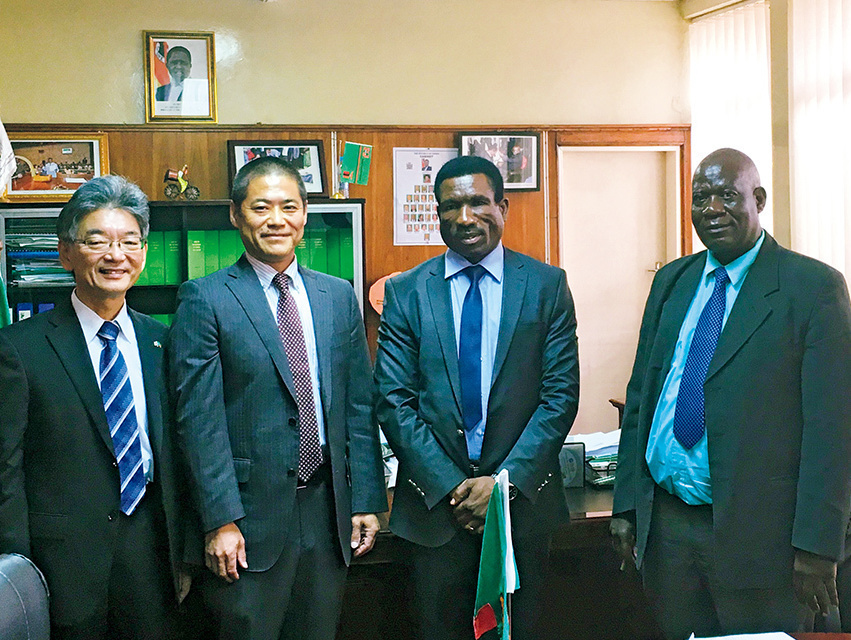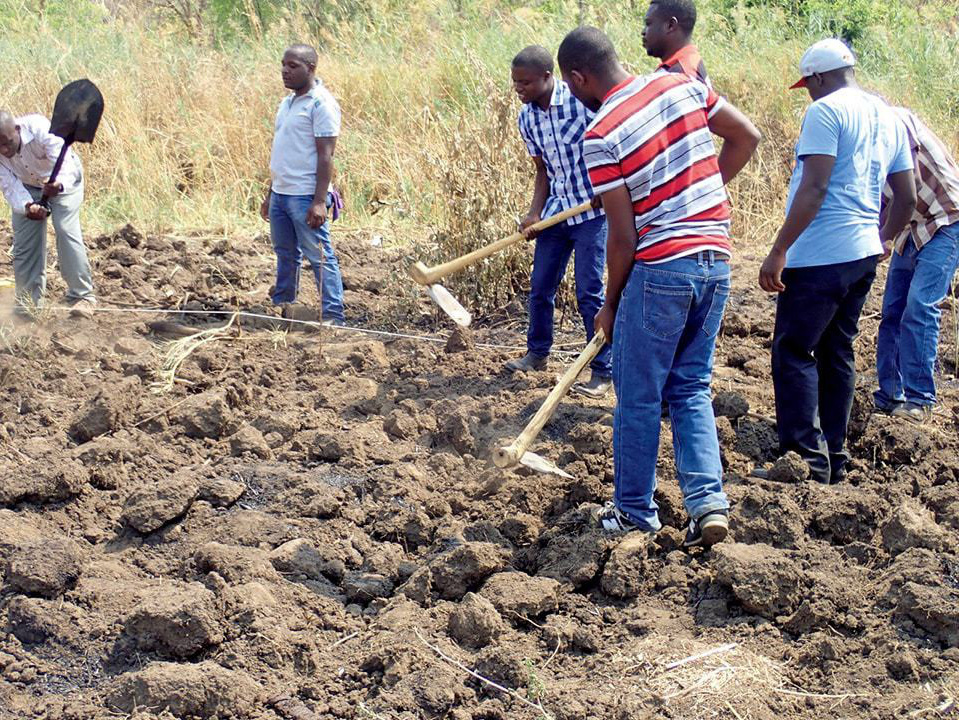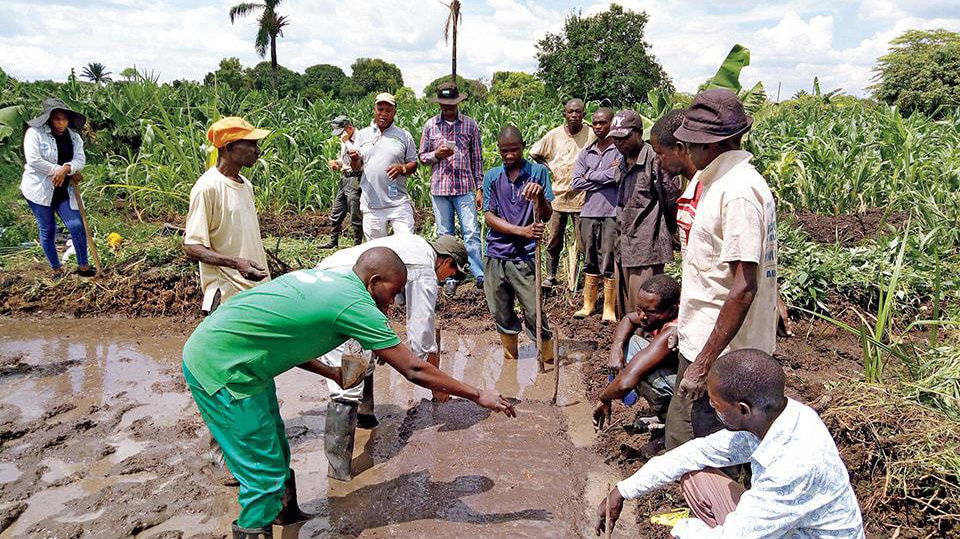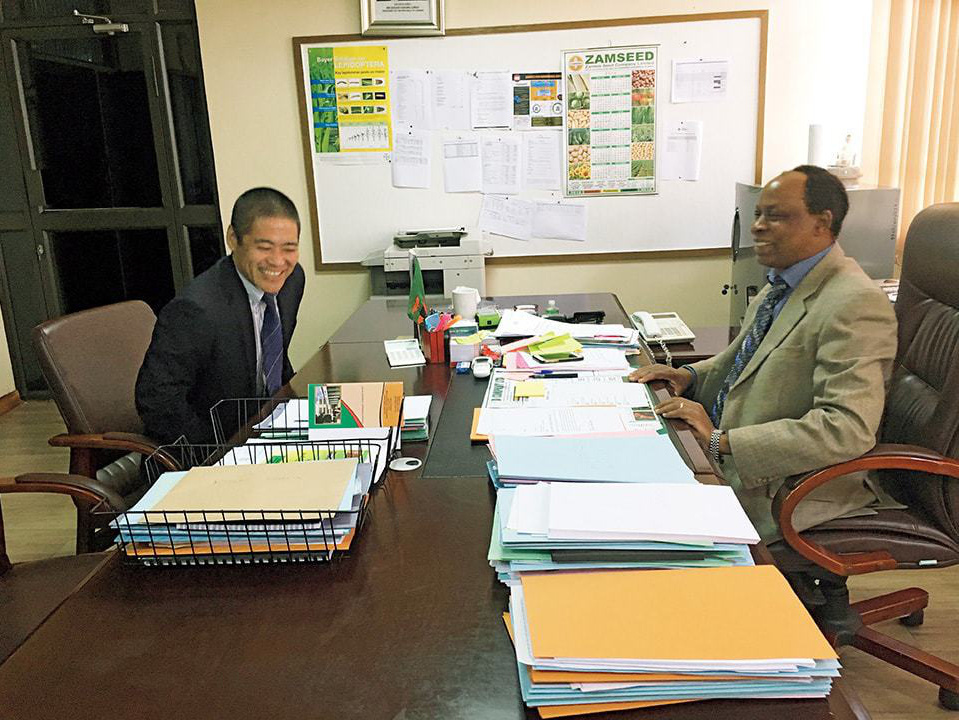Dispatched to Zambia as a response to the country’s request for infrastructural support

Inoue warmly welcomed in Zambia, From left to right: Hidenobu Sobashima: Ambassador Extraordinary and Plenipotentiary of Japan; Yutaka Inoue: Senior Agricultural Advisor to the Ambassador of Japan and the Advisor to the Department of Agriculture of Zambia; Micheal Z.J Katambo: Minister of Agriculture, Republic of Zambia; Peter K. Lungu: Director of Department of Agriculture, Ministry of Agriculture, Republic of Zambia.
Located in south-central Africa, Zambia boasts rich mineral resources including copper and cobalt. Since the mid-2000s, the country has achieved steady economic growth. However, 2014 marked a severe decline in international copper prices, which combined with other factors, has destabilized the country’s economy.
To reduce economic dependence on the mining industry, Zambia has launched an initiative to strengthen the agriculture sector in hopes of diversifying the economy for economic growth and poverty reduction.
While the agriculture industry accounts for 67% of Zambia’s workforce, it only contributes to 8.7% of the GDP. [1] Improved productivity will not only help the country’s economy but also contribute to food security as well as increase household incomes and improve living standards.


Japan’s irrigation development support project in Zambia to reap the harvest.
The pursuit of improved productivity led to the Zambian government’s request for assistance from Japan. Japan’s response was to send Yutaka Inoue from the Ministry of Agriculture, Forestry and Fisheries (MAFF) as the Senior Agricultural Advisor.
It wasn’t the first time that Japan provided Zambia agricultural support. Japan International Cooperation Agency (JICA) has aided with projects for technology introduction, community-based smallholder irrigation and dissemination of rice cultivation. Inoue, however, would offer a different variety of support.
As an advisory member to the Zambian government and the Senior Agricultural Advisor to the Ambassador of Japan in Zambia, Inoue held a position that helped both governments exchange detailed information including regional difficulties and cooperation measures. His new role enabled him to take the initiative to discover and plan more effective Official Development Assistance (ODA) projects in a more efficient way.
“My mission is to find further challenges based on the past JICA projects. Being in this position, I can always talk to the leaders of Zambia’s Agricultural Ministry, including the Minister, the Permanent Secretary, and the Director of Department. In this regard, it will be easier for us to grasp the country’s real needs and respond appropriately to those,” says Inoue.
Inoue developed agricultural infrastructure in regions around Japan as a MAFF official, and he worked with JICA in Africa as an agricultural water management specialist. In Tanzania, he was involved with developing the rice industry, and he helped with the Project for Strengthening Water Management Transfer for the Nile in Egypt. “From now on, I will be committed to enriching the soil in Zambia by moving forward with the irrigation and rice cultivation dissemination projects,” says Inoue.

Meeting with Julius Shawa, Agriculture Permanent Secretary. After joining the Ministry of Agriculture, Forestry and Fisheries (MAFF) of Japan, Yutaka Inoue worked on agricultural infrastructure development projects in various regions in Japan. He was sent to Zambia earlier this year after his activities supporting Tanzania and Egypt. Inoue is now the Senior Agricultural Advisor to the Ambassador of Japan and the Advisor to the Department of Agriculture of Zambia, Department of Agriculture, Ministry of Agriculture.
Water-rich Zambia produces almost 100% of its power from hydroelectric stations so one would think that with such abundant water resources, the country could put them to use for agriculture. Unfortunately, irrigation infrastructure is almost non-existent, and much of the land has yet to be developed. While the country’s area is classified as medium to high potential for agricultural production, only 15% is utilized, and very little of that is adequately irrigated. [2]
Over the past four years, JICA has supported a low-cost irrigation approach, community-based smallholder irrigation, in three provinces. The project is acclaimed for its practicality, effectiveness, and efficiency by the Zambian government as well as donor agencies.
Inoue is monitoring these activities, and now with his new role, he will be engaged directly with agriculture development within the Zambian government.
The Zambian government has high expectations for the new advisor. Agriculture Permanent Secretary Julius Shawa states, “Having Mr. Inoue in the Ministry will facilitate our internal information sharing and speed decision-making. He can directly communicate with both governments, and we are confident that he is an invaluable addition to our office.”
Inoue added excitedly, “I want to become the agricultural bridge between Japan and Zambia.”
[1] Ministry of Agriculture and Ministry of Fisheries and Livestock. 2016 Second National Agriculture Policy; Ministry of Department Planning; 2017 Seventh National Development.
[2] Embassy of Japan in Zambia Homepage; Aregheore, Eroarome Martin. Country Pasture/Forage Resource Profiles. FAO.





























